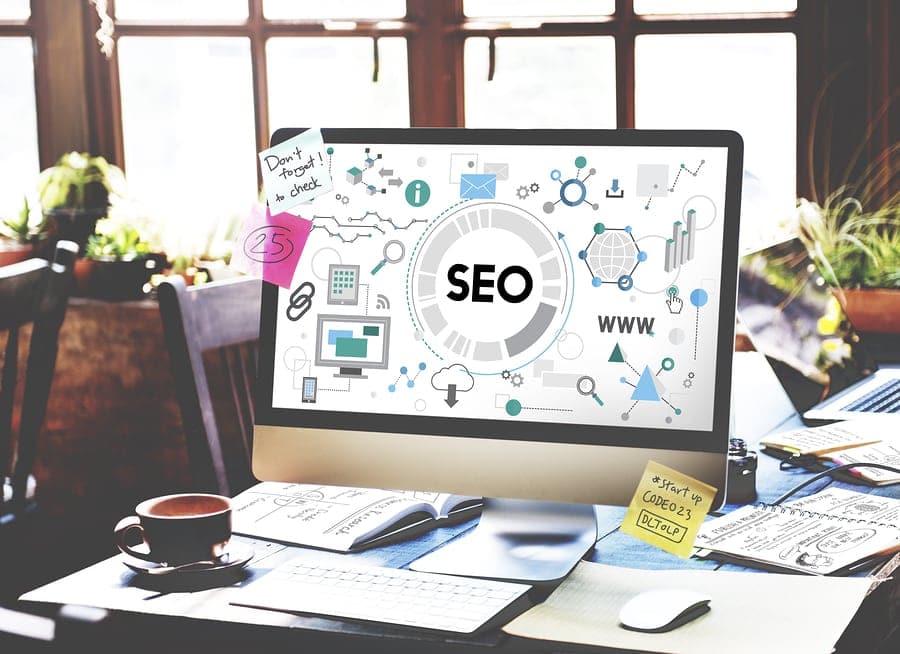SEO marketing is one of the most written-about topics in the digital marketing sphere, but only a handful of articles address the key decision maker at every company — the CEO.
A CEO needs to care about SEO (search engine optimization) and why it matters so that he or she can make decisions on SEO strategies that will benefit the company. Yet the vast majority of articles are written for an audience of webmasters and digital marketers.
A CEO needs different information. For a C-Suite executive, the nuts and bolts of how to implement an SEO strategy aren’t as important as understanding the case for developing an SEO strategy and the benefit it can have for website traffic, lead generation, sales volume, and overall business growth.
Deciding to develop and implement an SEO strategy is a big decision that can’t be done without engaging the head of the company.
So, with that in mind, here’s our most direct and high-level explanation of what SEO is, what it does, and why an SEO strategy is crucial for businesses today and tomorrow.
Schedule a Discovery Session
Learn how to attract new leads and clients.
What SEO Is and What It Does
The Basics
SEO stands for search engine optimization. Search engines — such as Google, Bing, and Yahoo — are software products that scan the content of your website, index it, and serve it up to search engine users looking for information that matches what’s on your website.
The “optimization” piece of SEO? That’s about tweaking how your website’s content is organized and communicated to search engines — which gets your website content shown to more search engine users, which means more website traffic, leads, customers, and sales growth.
Thus, SEO maximizes what your website does for your company.
Search Engines Are Computers, Not People
At this point, your CEO may stop you and ask why it is necessary to “optimize” a website they’ve already spent good money designing and building. It’s a good question.
In short, that’s because search engines are computer programs, not people. It might be helpful to show your exec what your website looks like in the Lynx text browser — this is how Google’s computer algorithms see your website and its contents.
In short, Google can’t see your great web design directly, but that design does still matter because statistical traffic and user data tell Google that you’ve got a great, usable web design.
Thus, optimizing a website is more about pleasing the computers that send customers to your website and less about pleasing the customers directly (that falls to your customer-facing marketing, sales, and customer service folks).
Good SEO Has a Huge Impact on Your Bottom Line
Why does this matter? For CEOs looking to solve a problem or innovate a process, SEO can:
- Fix flagging sales
- Improve brand recognition
- Increase lead volume
- Innovate lead generation, marketing, sales, or customer acquisition processes
Here’s a real-world example: Say you have a website with about a dozen pages. When web users do a Google search for, say, any one of about 20 keyword phrases, your site shows up in the search results. Depending on the search phrase and that web page’s current optimization, you could show up on page one or page 100.
Some phrases can return tens of thousands of results. And guess what? 61% of all clicks go to the first three Google search results. 91% goes to the ten results on page one.
If your web page is showing up on page two, you’re only getting seen by 9% of search engine users. But an SEO strategy could turn that around, more than tripling your visibility.
Here’s another example: say you’re already the fourth search result on page one. Using SEO to increase your rank by just one spot on the search engine results page (SERP), you could go from a 30% chance of a click to 61%.
Doubling or tripling your chance of website traffic through organic search could greatly impact your bottom line. Again, more traffic means more leads, more customers, and ultimately more growth for your business.
Why SEO Still Matters Today and Will Matter Tomorrow
But let’s say there are no big problems to fix, no rush to innovate the well-oiled machine of your business, plus your website redesign a few years ago took your current SEO needs into consideration. Does an SEO strategy still matter to your business today? The answer is yes, and the reason is threefold.
Search Engines Refine Their Product
Nothing stays the same for long in the business world, which is true of SEO marketing. Of primary concern for business websites is that search engines refine their software products frequently.
Tiny tweaks are made to Google’s algorithms “every day,” according to the search giant, and bigger changes happen at least quarterly, if not more often.
The fundamental SEO signals – quality content, time on site, page views, and quality backlinks – will always be important. So, although it’s essential to develop solid processes around content creation, landing page optimization, and link-building services, SEO will change over time.
This matters to CEOs because those changes can alter your website’s visibility. Google, in essence, moves the goalposts, and businesses and their marketing teams must adjust to maintain their search rankings (and their customer web traffic).
The Amount of Content Is Increasing
The amount of web content increases daily, but the audience for that content doesn’t, and neither does the money in those customers’ pockets.
Every new blog post, product page, and lead magnet can push your high-ranking Google search result further down the page, meaning fewer clicks, less traffic, fewer customers, and ultimately flagging sales.
As more businesses invest in content marketing, an SEO strategy might meet this challenge by adding new, optimized content to your site and improving the existing content, social media, or other tactics.
Competitors Are Using SEO
One of the reasons there’s so much talk of SEO is that more businesses realize its importance for staying competitive.
At least some of your business competitors are likely using SEO to maximize the impact of their websites.
Even without tweaks by the search engines, an improved optimization of a competitor’s web content may mean their search result displaces your own.
In short, an ongoing SEO strategy helps your business maintain its current favorable position and improve as you move forward.
Final Thoughts
For a CEO audience, the nuts and bolts of SEO aren’t as important — you’ve got talented people for that!
However, it’s important to understand the case for developing an SEO strategy and the benefit it can have for website traffic, lead generation, sales volume, and your overall business growth. In short, investing in an SEO marketing strategy today is going to make your business better.
If you have a problem or want to innovate your online business, SEO could be a good option to explore. Even if a business is great today, CEOs will do well to care about SEO for the future.
The constant updates to search engines, increasing amount of web content, and pressure from competitors may mean that a new SEO strategy is in your future.

